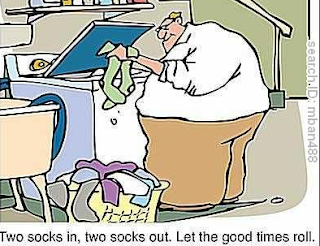Today I want to share two links from one my favourite sites, Understood.org
One is about creating a Strengths Chain and the other is about Lunchbox Notes. Both are PDFs for which I will add links.
And speaking of 'links', I will share with you how each of these has had an impact on my teaching career and personal life.
The Strengths Chain
Early in the second round of my teaching career, my sister shared with me a small item from Reader's Digest. It was about a discovery a mom made when going through her adult son's possessions after his death (in the military I think). She found a crumpled up piece of paper with her son's name on it and a list of positive attributes, which totally defined him in ways she had not thought of for a long time. She recognized it from his grade six teacher. That teacher had given each student in the class a list of all the students in the class and asked them to write a positive, truthful comment about each student in the space beside each name.
She then compiled all the comments for each student into individual lists. Sometime during the year she gave each student her/his list of attributes. Obviously it meant a lot to that young man because he had kept it close to him for over 20 years - and from the condition of the piece of paper had looked at it often.
I decided to adopt that practice and every year I would hand out a class list, ask my students to fill in the form - anonymously - , and I then compiled it for each student. To be honest, it was a lot of work but it was a joy because I knew what it would mean to each student and I learned a lot about my students. And because I am who I am, I included my name on the list!
I made a big ceremony of it when I handed out those lists. Students would sit quietly and read through all the positive comments. I still have those lists that my students wrote about me. It's a powerful exercise.
I can only hope that today's technology would make things a little easier.
Can you use that as a parent? Absolutely - you could expand it to the wider family circle and have each person fill it in electronically and you could compile the list for each family member and hand them out as gifts at Christmas (it would mean that it wasn't entirely anonymous if you were doing the collating but maybe using Google docs could help you with that!)
So here's a variation on highlighting strengths and attributes. It's a Strengths Chain. To help kids thrive, recognizing their strengths is just as important as working on their challenges.
Lunchbox Notes
So here's the 'text to self' link for me on this one. When John was working for IBM, he travelled a fair amount. Before he went away I'd write little 'suitcase' notes and hide them in various articles of clothing. When we talked each night he'd tell me which note he had found that day. After he retired and golf trips became the norm, I still added those notes. Once when I went to Australia for two weeks on a Girl Guide trip (lucky me) I found a big hug in my suitcase; one of my daughters had traced her hands on either ends of a long piece of fabric, tucked it in my suitcase, and then told me I'd find a hug in my suitcase!
I'm sure you've done something similar. In my quest to make things life easier for all of us, here's the link to the Lunchbox Notes. You can’t be at school to cheer your child on, but a little note in your child’s lunchbox can go a long way. Lunchbox notes can give kids a jolt of confidence in the middle of the school day. And that can be just the self-esteem booster kids who learn and think differently need.
I know you'll be creative and find ways to adapt both these 'tools'. When you do, please share.
- My sister told me that she wanted to make the 50+ Questions to ask at the end of the day more manageable (i.e., how to avoid carrying a big piece of paper around). I told her that I too was thinking of how to do that (not there yet but maybe Corrine, you'll share what you did create!)
- one of the questions that intrigued me was 'What colour socks did your teacher wear today?'. I realized I'd used that once or twice too often when I started to ask my middle grandson another question but starting with "What ...." and he finished my sentence with "colour socks did my teacher wear?" Corrine - I definitely need that reduced list!
- After writing about the importance of paper calendars I found an unused 2019 calendar and created my own 'big' calendar to take me to the end of 2019, and then I treated myself to a really good-looking agenda/calendar (after checking that it included the full year on 1-2 pages, as well as 12 monthly calendars).
- And I've started work on getting out of the house on time. It really does take several minutes to get from the bedroom and out the door. The day after I wrote that post about Life Hacks I thought I'd given myself enough time but lo and behold, it had snowed the night before and that added all kinds of unforeseen delays. I'm getting there!
- And finally, as I was searching for images for this post I found this one. Since one of my memes has always been that it is a sign of strength to ask for help, I found this one powerful.





















